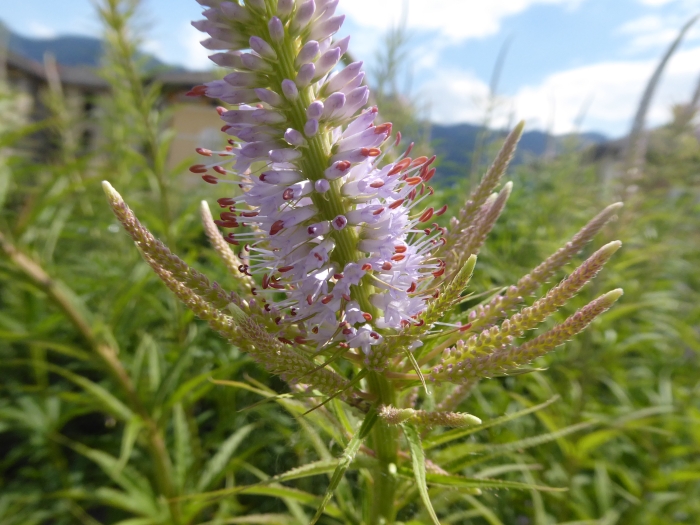Culver’s Root
(Veronicastrum virginicum)
Culver’s Root (Veronicastrum virginicum)
/
/

Syrio
CC BY-SA 4.0
Image By:
Syrio
Recorded By:
Copyright:
CC BY-SA 4.0
Copyright Notice:
Photo by: Syrio | License Type: CC BY-SA 4.0 | License URL: https://creativecommons.org/licenses/by-sa/4.0 | Uploader: Syrio | Publisher: Wikimedia Commons | Title: Veronicastrum_virginicum_-_Parco_di_Levico_02.jpg | Notes: Uploaded own work with UploadWizard |

































































































Estimated Native Range
Summary
Veronicastrum virginicum, commonly known as Culver’s Root, is a deciduous perennial herb native to open woodlands, prairie margins, and meadowlands in the Eastern and Central United States and Ontario. It is a member of the Plantaginaceae family, reaching heights of 200 cm (79 in) and spreading up to 45 cm (18 in) wide. Culver’s Root features candelabra-like spikes of tiny, tube-shaped white to pale blue flowers that bloom from mid to late summer, offering a striking vertical accent in the garden. The plant has whorled leaves and a strong, upright habit, rarely needing staking except in older clumps.
Culver’s Root is valued for its tall, elegant flower spikes that attract pollinators such as bees and butterflies, making it a beneficial addition to wildlife gardens. It is also used in borders, native plant gardens, and as a background plant in perennial beds. This plant thrives in full sun to part shade and prefers moist, well-drained soils. It is relatively low maintenance, but division every few years can help maintain vigor. While it can self-sow, it is not overly aggressive. Potential problems include powdery mildew in humid conditions and occasional leaf spot diseases.CC BY-SA 4.0
Culver’s Root is valued for its tall, elegant flower spikes that attract pollinators such as bees and butterflies, making it a beneficial addition to wildlife gardens. It is also used in borders, native plant gardens, and as a background plant in perennial beds. This plant thrives in full sun to part shade and prefers moist, well-drained soils. It is relatively low maintenance, but division every few years can help maintain vigor. While it can self-sow, it is not overly aggressive. Potential problems include powdery mildew in humid conditions and occasional leaf spot diseases.CC BY-SA 4.0
Plant Description
- Plant Type: Herb
- Height: 4-7 feet
- Width: 2-4 feet
- Growth Rate: Rapid
- Flower Color: White, Pink, Purple
- Flowering Season: Summer
- Leaf Retention: Deciduous
Growth Requirements
- Sun: Full Sun, Part Shade
- Water: Medium
- Drainage: Medium
Common Uses
Bee Garden, Butterfly Garden, Deer Resistant, Low Maintenance, Showy Flowers, Street Planting
Natural Habitat
native to open woodlands, prairie margins, and meadowlands in the Eastern and Central United States and Ontario
Other Names
Common Names: Virginia Culver’s Root, Blackroot, Bowman’s Root, Tall Speedwell, Véronicastre De Virginie, Véronique De Virgine, Kransveronika
Scientific Names: , Veronicastrum virginicum, Veronicastrum virginicum f. roseum, Leptandra virginica, Veronica virginica, Veronicastrum virginicum f. villosa, Veronicastrum virginicum f. virginicum, Veronica purpurea, Veronicastrum virginicum var. purpureum, Calistachya alba
GBIF Accepted Name: Veronicastrum virginicum (L.) Farw.